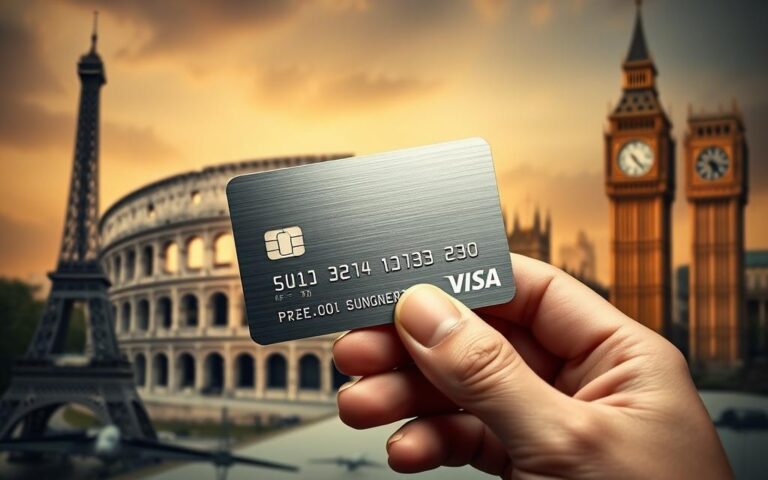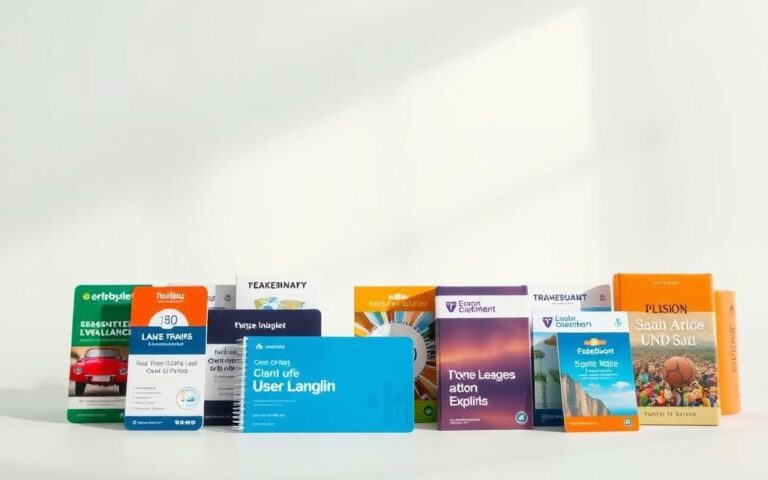Advertisement
Did you know nearly half of all travelers spend more than planned on long-term trips? Handling travel finances can seem hard but it’s key for fun trips. With smart money strategies, you can stretch your dollar and enjoy your travels more.
By planning your finances and setting a budget, your trips can become unforgettable. And you won’t worry about money. Next, we’ll share important tips for managing your money well on long trips.
Setting a Realistic Travel Budget
Making a detailed travel budget is key for any trip. It helps figure out real travel costs and makes sure money lasts. You should think about things like where you’ll stay, what you’ll eat, how you’ll get around, and what you’ll do. Knowing about these parts helps in keeping track of spending.
Key Elements of a Travel Budget
When planning your budget, think about these important parts:
- Accommodation: Look up different places to stay to find the right mix of comfort and price.
- Meals: Think about whether you’ll eat out or buy food to cook.
- Transportation: Remember to include costs for flights, local travel, and renting a car.
- Activities: Plan money for tickets to places and special events.
Also, consider where you’re going, how long you’ll stay, and your spending habits. These greatly affect how much you’ll need.
Tips for Budgeting on the Go
Sticking to a budget while traveling takes effort. Here are some tips to help:
- Use budgeting apps: Use tech to keep track of what you spend as you go.
- Keep daily logs: Writing down what you spend each day helps you stay on track.
- Adjust as needed: If you’re spending too much, find ways to spend less.

Good budgeting is key to a great travel experience. Use these ideas to protect your money and fully enjoy your travels without stress.
Understanding Foreign Currency Exchange
When you travel abroad, handling money becomes a bit tricky. It’s key to grasp how foreign currency exchange works to save money and spend wisely. Exchange rates and hidden charges can eat into your budget. By using smart tips for changing money, you’ll keep more cash in your pocket during your trip.
Best Practices for Currency Exchange
Here’s how to get good rates and keep fees low when exchanging currency:
- Exchange currency before traveling: Do this at a bank or currency exchange service to lock in better rates.
- Avoid airport exchanges: Airports often offer less favorable rates and higher fees.
- Use local ATMs: Withdraw cash in the local currency to avoid conversion fees from your home bank.
Apps for Currency Conversion
There are several apps that make converting currency easy for travelers. These apps help you monitor exchange rates on the go:
- XE Currency: This app provides live exchange rates and allows users to set alerts for rate changes.
- Currency Converter Plus: Offers a user-friendly interface with historical data for insight into rates over time.
- Revolut: Ideal for travelers, it allows users to hold and exchange multiple currencies with ease.

Choosing the Right Financial Products
Travelers can gain a lot by knowing about different financial products made for them. Choosing the right financial tools makes traveling better, offering convenience and security. They should look at various travel credit options and prepaid travel cards to find the best match for their travel style.
Travel-Friendly Credit Cards
Many travel-friendly credit cards offer good rewards and benefits. Cards from Chase Sapphire Preferred and Capital One Venture don’t charge extra for transactions in other countries. This can help save money when traveling abroad.
These cards give points or miles for spending money, which can be used for flights and hotels. They also offer important benefits like trip cancellation insurance and protection against fraud. These perks help travelers deal with surprises while away from home.
Advantages of Prepaid Travel Cards
Prepaid travel cards are great for travelers watching their budget. They let you put a set amount of money on the card to control spending better. Options like the Travelex prepaid card or the Wise multi-currency card are user-friendly and offer good exchange rates.
These cards are perfect for people living abroad who might struggle with local banks. They also provide protection against theft, making travelers feel safer than carrying cash or just using credit cards.
| Feature | Travel-Friendly Credit Cards | Prepaid Travel Cards |
|---|---|---|
| Foreign Transaction Fees | No | Varies |
| Rewards Program | Often available (points/miles) | No rewards |
| Spending Control | Less control over spending | Direct load limit |
| Security | Fraud protection available | Generally secure |
| Best for | Frequent travelers and rewards seekers | Budget management and expats |
Saving Money on Accommodation
Traveling often means looking for places to stay that don’t break the bank. By looking into different options other than hotels, travelers can find affordable places to sleep. Options include hostels and home exchanges. Also, joining travel rewards programs can offer big savings and extra perks.
Alternative Lodging Options
There are many ways to find cheaper lodging than hotels. Some popular methods are:
- Hostels – They offer budget-friendly options and a chance to meet other travelers.
- Vacation Rentals – Sites like Airbnb let you rent homes or rooms, often cheaper than hotels.
- Home Exchanges – You can swap houses with someone else, which saves money and offers unique experiences.
- Couchsurfing – This platform helps travelers find free places to stay with locals, making new friends.
Utilizing Travel Reward Programs
Travel rewards programs are a great way to save. Many hotel and travel sites give points for spending money, which can be used later for free stays or upgrades. Joining loyalty programs from big names like Marriott, Hilton, or Hyatt can get you special deals, better rates, and free stuff. Also, using credit cards for travel rewards can boost savings through points on everyday purchases.
| Accommodation Type | Average Price per Night | Pros | Cons |
|---|---|---|---|
| Hostel | $20 – $50 | Social atmosphere, budget-friendly | Shared facilities, noise |
| Vacation Rental | $70 – $150 | Home-like comforts, more space | Cleaning fees, variable quality |
| Hotel | $100 – $300 | Consistent service, amenities | Higher cost, less unique experience |
| Home Exchange | Free | Unique experiences, cultural immersion | Requires planning, trust issues |
Managing Daily Expenses
It’s key for travelers who want to make their money last longer to manage daily expenses well. Keeping an eye on what you spend daily can really help plan the entire trip’s budget. Using budgeting tools and apps can also make tracking travel costs a lot easier.
Tracking Expenses Effectively
Using apps made for tracking travel expenses can help you get a grip on your spending. Some popular options include:
- Expensify: Great for keeping tabs on receipts and expenses while on the move.
- Trail Wallet: Helps travelers easily follow how much they’re spending.
- Mint: A powerful tool for managing your money and staying healthy financially.
Keeping those apps updated allows you to see where your money goes. This helps adjust your spending as needed.
Tips for Reducing Day-to-Day Costs
You can cut down on travel costs without missing out on fun. Here are some strategies:
- Eat meals at your place of stay rather than eating out.
- Look for free or cheap things to do, like visiting parks or museums.
- Find local deals through community boards or travel apps.
Using these tips, travelers can stick to their budget and enjoy their trip fully.
Protecting Your Finances While Traveling
Ensuring financial protection while traveling is essential for a smooth experience. There are many ways to keep your money safe abroad. Travelers can use different methods to protect their cash, credit cards, and personal info from theft or loss. Taking these steps helps you relax and enjoy your trip more.
Securing Your Cash and Cards
One smart way to keep cash and cards safe is by using money belts or hidden pouches. These keep your valuables out of sight and hard for thieves to get. Also, using secure lockers at your place to stay helps protect your money while you explore.
- Keep small amounts of cash for daily expenses.
- Use digital wallets for added convenience.
- Stay aware of your surroundings, especially in crowded areas.
- Set up alerts for your bank and credit card accounts to monitor transactions.
By taking steps to secure your money abroad, travelers can lower the risk of loss. This lets them enjoy their adventures without worrying about money.
Insurance Options for Long-Term Travelers
Travel insurance is crucial for expats to avoid unexpected financial problems abroad. It provides coverage tailored for those staying away long-term. This coverage includes medical care, trip cancellation, theft, and liability.
| Insurance Type | Description | Benefits |
|---|---|---|
| Comprehensive Medical | Covers medical expenses during travel | Peace of mind in case of health emergencies |
| Trip Cancellation | Reimburses costs for canceled trips | Financial protection against unforeseen events |
| Theft Protection | Replaces stolen items | Financial recovery from theft incidents |
| Liability Coverage | Covers legal fees or damages | Protection from unexpected liabilities |
Choosing the right travel insurance helps expats stay financially safe while abroad. It lets them focus on making great memories instead of financial worries.
Preparing for Unexpected Expenses
Traveling is exciting but can bring surprise costs that hurt your wallet. To be financially ready, start an emergency fund before you go. Aim to save 10-20% of your total travel budget. This extra money can help with things like medical issues, last-minute cancellations, or changes in your trip plans.
Building an Emergency Fund
Creating an emergency fund is key to a worry-free trip. Think about where you’re going and the possible risks. This helps you decide how much to save. Keep this money in an easy-to-reach bank account or on a prepaid debit card. That way, you can quickly use it if an emergency comes up. Check and adjust your fund regularly, based on how often you travel and where you go.
Strategies for Handling Emergencies
Knowing what to do in an emergency overseas can reduce stress from unexpected expenses. Have important phone numbers for local banks and emergency help on hand. Learn how to get money while abroad, including any charges. Using credit cards smartly can also help, as they offer protection and rewards. With these strategies, you can enjoy your trip without worrying about surprises.



